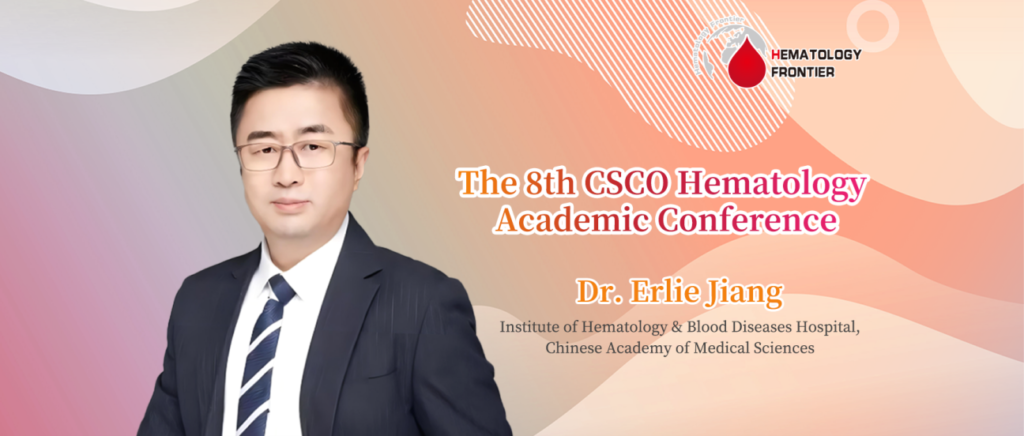
Editor's Note: To further enhance the diagnosis and treatment of leukemia and lymphoma in China, the 8th Hematology Academic Conference, jointly organized by the Chinese Society of Clinical Oncology (CSCO), CSCO Leukemia Expert Committee, and CSCO Lymphoma Expert Committee, and co-hosted by Harbin Institute of Hematology and Oncology and Peking University Cancer Hospital, was grandly held in Harbin from July 26 to 28, 2024. On this occasion, "Oncology Frontier - Hematology Frontier" invited Dr. Erlie Jiang from the Institute of Hematology & Blood Diseases Hospital, Chinese Academy of Medical Sciences, to discuss the frontier topic of hematopoietic stem cell transplantation (HSCT).Oncology Frontier – Hematology Frontier: Despite the emergence of new drugs, hematopoietic stem cell transplantation (HSCT) remains crucial in treating acute lymphoblastic leukemia (ALL). Could you describe the current application of HSCT in adult ALL?
Dr. Erlie Jiang: Despite the emergence and clinical application of new treatment methods such as targeted drugs, antibody drugs, and cellular immunotherapy, hematopoietic stem cell transplantation remains a crucial treatment in adult hematological malignancies. While some new drugs have shown impressive results, they often come with high costs, posing a significant financial burden on patients. Long-term application of these therapies is challenging due to the high expenses and the lack of sufficient long-term efficacy and clinical practice validation. Therefore, we must remain cautious and require more scientific research and data to support the safety and efficacy of these new drugs.
In contrast, HSCT has been developed and refined over decades, with both autologous and allogeneic transplantation showing well-documented efficacy. In recent years, the number of adult ALL patients undergoing HSCT has continuously increased in China. Last year, our hospital achieved an unprecedented milestone, successfully completing over 3,000 transplantation procedures. Therefore, in the next 5 to 10 years, HSCT will continue to be one of the most critical treatment methods for adult ALL. With the ongoing advancements in medical science and technology, the efficacy of HSCT is expected to further improve, offering better treatment options and hope for ALL patients.
Oncology Frontier – Hematology Frontier: What are the main advantages and limitations of autologous HSCT in treating ALL? What potential research directions could address these limitations?
Dr. Erlie Jiang: Autologous HSCT has unique advantages and limitations in the treatment of adult diseases. Compared to allogeneic HSCT, the most significant advantage of autologous transplantation is its extremely low transplant-related mortality, usually below 10%, much lower than the 20% associated with allogeneic transplantation. Additionally, autologous HSCT shows excellent long-term efficacy, making it a valuable treatment option for specific diseases.
However, autologous HSCT also has notable drawbacks, such as a relatively high relapse rate. Our hospital’s data indicate that in high-risk patient groups, the relapse rate for autologous HSCT is about 10% higher than that for allogeneic transplantation, and about 5% higher in standard-risk groups.
Despite its limitations, the unique advantages of autologous HSCT make it an indispensable treatment method in adult disease therapy. With continuous medical advancements and ongoing research, we are optimistic that new methods and technologies will emerge to overcome these limitations, further enhancing the efficacy and safety of autologous HSCT, bringing greater benefits to patients.
Oncology Frontier – Hematology Frontier: When determining whether adult ALL patients are suitable for autologous or allogeneic HSCT, what factors do you usually consider? Are there specific patient groups that are more suited for autologous HSCT?
Dr. Erlie Jiang: When evaluating whether adult patients are suitable for autologous or allogeneic HSCT, we usually consider two critical factors. First, the rate of minimal residual disease (MRD) reduction is a key indicator of treatment efficacy. Second, genetic risk stratification is an essential evaluation factor. Among these, the MRD reduction rate is particularly significant, greatly influencing treatment decisions. Based on comprehensive analysis of our hospital and international data, patients who achieve MRD negativity after three treatment cycles tend to show stable efficacy with autologous HSCT. Compared to allogeneic HSCT or chemotherapy, these patients exhibit superior treatment outcomes.
Oncology Frontier – Hematology Frontier: Looking ahead, how do you foresee the development of HSCT in treating adult ALL? Are there emerging technologies or therapies that could be combined with HSCT to improve patient outcomes?
Dr. Erlie Jiang: Both autologous and allogeneic HSCT have achieved significant efficacy in treating hematological malignancies, but they also come with limitations such as transplant-related complications and graft-versus-host disease. In the next 5 to 10 years, while HSCT will continue to play an important role, advancements in medical technology might gradually replace these traditional methods with more advanced treatment options. Cellular immunotherapy has shown great potential and promise as an emerging treatment modality. Targeted therapies, which specifically act on molecular targets of tumor cells, inhibit tumor growth and spread. However, these new treatments still need further validation and improvement in terms of stability and long-term efficacy. Currently, a comprehensive treatment strategy combining transplantation with targeted therapy or immunotherapy is commonly used. This multi-modal treatment approach not only enhances efficacy but also reduces relapse rates. These treatments complement each other, injecting new vitality and hope into the development of hematological malignancies. With deeper research and technological maturation, we expect to see more innovative and effective treatments, further improving the treatment outcomes and quality of life for patients with hematological malignancies.
Dr. Erlie Jiang
- Director, Stem Cell Transplantation Center, Institute of Hematology and Blood Diseases Hospital, Chinese Academy of Medical Sciences
- MD, Chief Physician, Doctoral Advisor
- Chairman, Hematopoietic Stem Cell Transplantation Committee, China Primary Health Care Foundation
- Leader, Leukemia Autologous Transplantation Collaboration Group, China Hematology Specialist Alliance
- Deputy Leader, Hematopoietic Stem Cell Application Group, Hematology Branch of the Chinese Medical Association
- Standing Committee Member, Hematological Oncology Committee, Chinese Anti-Cancer Association, and Deputy Leader of Hematopoietic Stem Cell Transplantation and Cellular Therapy Group
- Deputy Leader, CSCO Autologous Hematopoietic Stem Cell Transplantation Working Group
- Standing Director, Tianjin Anti-Cancer Association
- Vice Chairman, Tianjin Society of Hematology and Regenerative Medicine
- Editorial Board Member, “Chinese Journal of Hematology,” “Leukemia & Lymphoma,” and other journals


